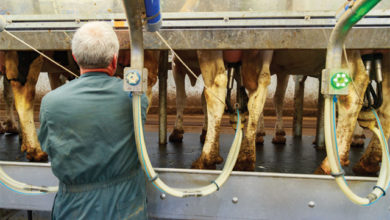Sustainability is close to our heart and it should be to yours

At the core of Devenish there is a clear passion for innovation, writes Dr Marian Scott, Innovation and Development Manager at Devenish.
The innovation cycle starts and ends with our customers. We keep people and partnerships at the heart of our research programmes to ensure we continue the success we have achieved over the last 20 years. This is due to the vision that is held within the company that differs from convention.
Rather than simply look at how to drive more production we focus on better production to drive production systems that improve performance and create value for our customers. This, I believe, is where the sustainability of our company is, right at the heart and driving along the chain.
Our vision is to be a leading provider of integrated environmental, animal and human health solutions. The world over, it is clear that farmers must produce more food per unit of land with minimal waste and environmental impact.
We also have to consider what the consumer demands from food. They want affordable, healthy food from a safe, value added chain, from sustainable sources with minimal impact on the environment. This is what we at Devenish call ‘One health, from soil to society’. It is one integrated value chain – soil, plants, animals, farming, processing and the environment all working in harmony to deliver safe nutritious food.
Soil is the foundation of the chain. The Devenish three-step soil improvement programme, delivered in partnership with Thompson and Joseph, focuses on optimisation of nutrients from soil to forage, driving on the nutrients for animal feed, ultimately impacting positively on animal and consumer health.
Food must be considered as a conveyor of nutrients which can be used as a tool for prevention and cure of ill health. The increase of empty calories within nutrition has resulted in a spectacular rise of the clinically overweight. We believe that the provision of a balanced nutrient supply to livestock will result in a balanced nutrient supply to humans.
Working in partnership with Waitrose and Moy Park we have developed the world’s first naturally enriched omega 3 chicken. It is produced by feeding the birds a naturally enriched diet resulting in the enriched chicken which looks and tastes like conventional chicken but with sufficient omega 3 levels to promote heart, brain and vision health.
Sustainability simply is the “ability to maintain or support an activity or process over the long-term”. With this in mind we have to make the direct correlation that driving sustainability appropriately will drive efficiency for producers. We, at Devenish, have developed a number of innovative products to assist our producers in doing just this.
“A land mass the size of Northern Ireland would be saved from planting with soybean if DeviGain was offered to European Pigs.”
Two main emphases of an EU environmental review of intensive farming were to reduce the pressures on the environment by reducing pesticides and nutrients, with the other being improve air quality. We have developed a product called DeviGainPG, a unique concentrated protein which the finishing pig can utilise more effectively. Driving efficiency, drives profitability and reduces the environmental footprint.
DeviGainPG has been shown to reduce Greenhouse Gas emissions by up to 16 per cent (verified by SAC AgRE Calc, Calculator accredited to BSI, PAS 2050) and allows crude protein to be dropped by 3 percentage points. The drop in crude protein can reduce ammonia emissions by up to 30 per cent, reduce N excretion by 25 per cent while reducing slurry volume by 9-12 per cent.
As a business we do hold sustainability close to our heart and through one of our many systems have the potential to aid delivery to you.
For more information on Devenish:
W: www. devenish.com
T: +44 (0)28 9075 5566.
Twitter: @DevenishNutri







